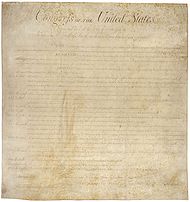SOPA opponents unveil ‘Digital Bill of Rights’
June 13, 2012 | Source: ars technica

United States Bill of Rights
The “Digital Bill of Rights” debuted at the Personal Democracy Forum in New York City on Monday. The document draft comes from Rep. Darrell Issa (R-CA) and Sen. Ron Wyden (D-OR), two key figures in the battle against SOPA.
Issa and Wyden created the Digital Bill of Rights because they were concerned about what seemed like a legal oxymoron: lawmakers trying to regulate the Internet without understanding how individuals use it.
“Government is flying blind, interfering and regulating without understanding even the basics,” Issa wrote on his website, KeepTheWebOpen.com. “Where can a digital citizen turn for protection against the powerful?”
At the conference, Wyden likened this project to a digital version of the “Constitutional convention.” It’s a convention that Issa and Wyden hope Internet users will participate in. On Issa’s site, he openly encourages readers to consider the current draft and suggest revisions (at the publication of this post, several individuals have already logged in to take that offer). Currently, the ten key rights are as follows:
- The right to a free and uncensored Internet.
- The right to an open, unobstructed Internet.
- The right to equality on the Internet.
- The right to gather and participate in online activities.
- The right to create and collaborate on the Internet.
- The right to freely share their ideas.
- The right to access the Internet equally, regardless of who they are or where they are.
- The right to freely associate on the Internet.
- The right to privacy on the Internet.
- The right to benefit from what they create.
Have any edits for Issa and Wyden? Contribute directly (sign-up required) or add them in the comments below.
A Digital Citizen’s Bill of Rights
I believe that individuals possess certain fundamental rights. Government should exist to protect those rights against those who would violate them. That is the revolutionary principle at the heart of the American Declaration of Independence and U.S. Constitution. No one should trample our right to life, liberty and the pursuit of happiness. That’s why the Bill of Rights is an American citizen’s first line of defense against all forms of tyranny.
But where can a digital citizen turn for protection against the powerful? This question lay at the heart of the fight to stop SOPA and PIPA and keep the web open. While I do not have all the answers, the remarkable cooperation we witnessed in defense of an open Internet showed me three things. First, government is flying blind, interfering and regulating without understanding even the basics. Second, we have a rare opportunity to give government marching orders on how to treat the Internet, those who use it and the innovation it supports. And third, we must get to work immediately because our opponents are not giving up.
We need to frame a digital Bill of Rights. This is my first draft. I need your help to get this right, so I published it here in Madison for everyone to comment, criticize and collaborate. I look forward to hearing from you and continuing to work together to keep the web open.
— Congressman Darrell Issa